
Parliament of India
Stamp in memory of late freedom fighter Agrawal
Kumar said Agrawal was the first to start the plan for construction of Rain Baseras for night stay of footpath dwellers. She also recalled his efforts to get the Yamuna river cleaned and provide clean drinking water to people here.
Delhi Chief Minister Shiela Dixit, Minister of State for Communication and IT Sachin Pilot, AICC General Secretaries Rahul Gandhi and Janardan Dwivedi and AICC Treasurer Motilal Vora were present on the occasion in the Parliament complex. Parliamentarians pay floral tributes to TilakBy Deepak Arora
Among the dignitaries who paid floral tributes to Bal Gangadhar Tilak were Leader of the House in Lok Sabha and Union Minister of Finance Pranab Mukherjee; Leader of Opposition in Lok Sabha L.K. Advani; Leader of Opposition in Rajya Sabha Arun Jaitley, Union Minister for Parliamentary Affairs and Water Resources Pawan Kumar Bansal; Union Minister of State for Planning and Parliamentary Affairs V. Narayansamy; Union Minister of State for External Affairs Shashi Tharoor; Members of Parliament and former Members of Parliament. The Secretary-General of Lok Sabha Shri P.D.T. Achary also paid floral tributes. A booklet containing the profile of Lokamanya Bal Gangadhar Tilak, brought out in Hindi and English by the Lok Sabha Secretariat, was also presented to the dignitaries who attended the function. The portrait of Lokamanya Bal Gangadhar Tilak was unveiled by the then Prime Minister of India, Pandit Jawaharlal Nehru, in the Central Hall of Parliament House on 28 July 1956. 'Joint statement' may be bad drafting, admits Menon
"With Pakistan it is not a T-20 match," the foreign secretary said in a lecture here attended by Parliamentarians. "One can argue how good or bad the drafting was...you can say it is bad drafting, but the meaning is clear," he said responding to criticism of the joint statement issued from Egypt after a meeting between Prime Minister Manmohan Singh and his Pakistani counterpart Yousuf Raza Gilani. Menon said India's attempt with Pakistan has been three-fold, one of which is to "bring it back to the fundamental issue of terrorism".
Singh has made it clear that the dialogue cannot go forward unless Pakistan takes credible action to dismantle terror infrastructure and stop Pakistani soil from being used for terror acts against India. "We said no, and made it quite clear that the issue is terrorism and we are not going to start any composite dialogue without that," Menon said responding to Pakistan's stand of linking the resumption of the composite dialogue with the action against terrorism. "India also conveyed to Pakistan that just because there is no composite dialogue, they cannot stop action against terror," he said. On the inclusion of Balochistan in the communique, Menon said, "Pakistan has been saying this for long. We said we have nothing to hide." On Arunachal, he said India has been maintaining that China has no claim over it. Andhra Speaker calls on Meira Kumar
The Lok Sabha Secretary-General P.D.T. Achary was also present during the talks. Oscar addresses New MPs on MPLAD schemeBy Deepak Arora
The new MPs attentively listened to Mr Fernandes to understand and learn on the scheme that allows them to people friendly projects in their respective constituecies. The MPs also asked questions on the scheme to Mr Fernandes and he gave detailed response to them. The Orientation Programme for the newly-elected members of 15th Lok Sabha is being organized by the Bureau of Parliamentary Studies and Training(BPST) of the Lok Sabha Secretariat. Pranab addresses new MPs on Budgetary processBy Deepak Arora
The Orientation Programme has been organized by the Bureau of Parliamentary Studies and Training (BPST) of the Lok Sabha Secretariat. Mrs Margaret Alva is the Honorary Advisor of the Bureau of Parliamentary Studies and Training.
Lok Sabha Speaker Meira Kumar had inaugurated the week-long Orientation Programme for the newly-elected MPs on Monday. In her inaugural address, Ms Kumar said that as a large number of members were quite young, she looked forward to freshness in approach, new ideas, vibrancy, zeal and above all a passion for changing things for the better. Lok Sabha passes Rail Budget ’09-10
The minister also assured the House that the proposed "White Paper" on past five years of the railways’ performance is not directed against her predecessor Lalu Prasad Yadav, rather it is being done to asses the status of the department to take decisions for the future. She said her step was nothing unusual as her predecessors George Fernandes and Nitish Kumar had also carried out such an exercise earlier. Ms Banerjee, however, did not give any time-frame despite BJP leader Ananth Kumar insisting that it be unveiled on the first day of the Winter Session. "The timing will depend on internal and external audits," she added. Announcing a slew of measures to tone up the functioning of the railways in terms of amenities and safety, Ms Banerjee said she has constituted an expert committee headed by Ficci secretary general Amit Mitra to prepare a roadmap for the department to involve the private sector in developing and modernising facilities. She, however, rejected the allegations that she was trying to privatise Indian railways, saying that she will be the last person to think about it. "Even the surplus railways land will not be sold to private parties under Public Private Partnership (PPP), rather they will be given to them on lease agreement of 99 years," she emphasised. Catering to regional sentiments, which have often erupted in the form of violence in recent times, the minister favoured 50 per cent quota for locals in induction in railways through the Railway Recruitment Board (RRB) and question paper in regional languages as she promised to review the process of intake. She included Goa among the list of 50 odd proposed stations to be developed as world class, the minister also added two more "duronto" (non-stop) trains, one between New Delhi and Secunderabad and another between New Delhi and Nagpur. Lok Sabha Speaker addresses House orientationBy Deepak Arora
Inaugurating the a week-long orientation programme for the newly-elected members of the 15th Lok Sabha on Monday, Ms Kumar said that as a large number of members were quite young, she looked forward to freshness in approach, new ideas, vibrancy, zeal and above all a passion for changing things for the better. While urging the members to set new targets for themselves in the service of the people, Ms Kumar said: "the people have reposed their trust in you and expectation from you."
The elected representatives who have constant interactions with the people in their constituencies, have a lot of potential to educate the masses about the importance of democracy and also about their own role in its advancement for their socio-economic transformation, she opined. “The people have reposed their trust in you and have expectations from you. I am confident that you will prove worthy of the people’s trust and your commitment and devotion would go a long way in taking the country forward”, Lok Sabha Speaker observed. Such devices provide ample opportunities to members to discuss policies and programmes, budgetary and financial business and legislative matters, criticize shortcomings of the administration, ventilate public grievances and elicit information, he observed. Earlier, the Lok Sabha Speaker also inaugurated an Exhibition on “Parliamentary Democracy in India: Marching Ahead” put up by the Parliamentary Museum and Archives, at the Foyer of Parliament House Annexe. Among others who will address members at the Orientation Programme are Union Finance Minister Pranab Mukherjee, Former Union Ministers -- Shivraj V. Patil and Oscar Fernandes; Honorary Advisor, BPST, Margaret Alva; and the Secretary-General, Lok Sabha, Shri P.D.T. Achary. Govt raises Income Tax sops; incentive for farm, exporters
In tune with the poll promises made by the Congress and reflecting the pressures of the global financial crisis, Finance Minister Pranab Mukherjee presented the Budget for 2009-10 that contained a series of measures that could be termed popular. Beginning with incentives for individual tax payers that included an additional exemption of Rs 15,000 for senior citizens and Rs 10,000 for women and others, Mukherjee also abolished Fringe Benefit Tax that could ease pressure on employers in giving benefits to the workers, but there was no change in corporate tax as also the rates for customs, excise and service tax. The stock market, however, tanked, with BSE benchmark plunging by over 700 points. The government pleased its constituency 'aam admi' (common man) by keeping its poll promise with a proposal to enact a Food Security Act for providing 25 kg of rice or wheat a month to the poor at Rs 3 kg. Attaching the highest priority for infrastructure, where government institutions and banks could finance Rs one lakh crore for projects in addition with private flow, Mukherjee said that the present conditions and uncertainty about global recovery would make it difficult for him to focus on fiscal deficit which would shoot to 6.8 per cent from 2.7 per cent last year. He said additional revenue would be mobilised through disinvestment of government equity in public sector undertakings and other steps, but said that interest payment alone would be over Rs three lakh crore largely on account of the burden of stimulus packages announced last year that helped the economy grow by 6.7 per cent. However, he said that government would have the ownership of banks and insurance companies even as disinvestment takes off while reiterating that state holding in these entities would be at least 51 per cent. Mukherjee also announced a number of sector specific incentives, particularly for those that promote employment, and announced a hike in provision for flagship schemes like NREGA by 144 per cent to Rs 39,100 crore and said that government would also provide a minimum of Rs 100 a day under the job guarantee scheme. India Inc largely welcomed the intiative for attaining nine per cent economic growth, but said that areas like Securities Transaction Tax and Minimum Alternate Tax, which Mukherjee proposed to hike from 10 per cent to 15 per cent, should have caught the government's favourable attention. He proposed an overall expenditure of Rs 10,28,838 crore - this is the first time since independence that expenses have crossed Rs 10 lakh crore mark - but nearly seventy per cent of this would be accounted by non-plan expenses, large part of which was on account of additional expenses for implementation of Sixth Pay Commission, food and fertiliser subsidy, interest payment and defence outgo. Mamata spares passengers
It is for the first time in six years that passenger and freight charges have been left untouched. Ms. Banerjee took the opportunity to outline the Railway’s road map by setting up a series of committees to prepare the blue print for the path ahead and held back announcement of new projects for want of clearance from the Planning Commission. These would be announced in due course of time. Ms. Banerjee proposes to initiate a record 57 new train services, extend the services of 27 other trains and increase the frequency of 13 others. This includes a dozen trains, which would run without any halt from point to point under the nomenclature “Duronto (superfast) trains,” the low-cost air-conditioned trains with seating arrangements dedicated to the young generation and the low-income group and women-only EMU trains to be introduced in Delhi, Chennai, and Kolkata suburban during rush hour. She also proposed to introduce air-conditioned double-decker coaches for inter-city passengers. Ms. Banerjee announced a new scheme for labourers earning less than Rs.1,500 a month allowing them to travel up to 100 km to their place of livelihood at a concessional monthly season ticket (MST) of Rs. 25 per month under the scheme “Izzat,” which she said was to accord dignity to workers of the unorganised sector. The budget proposes to extend the existing MST for students to those studying in madrasas, higher and senior madrasas. The MST available to students in Kolkata will be applicable in Metro Rail Kolkata also. She announced the revision of the Tatkal Scheme under which the period of booking the ticket has been reduced from five days to two days. The minimum charge would be Rs. 100 instead of Rs.150 and the fare would be charged for the destination instead of the entire route of the train as of now. On the other hand, she intends to set up 50 multi-functional complexes at railway stations serving pilgrimage, tourist and industry centres, encourage private ownership of special purpose rolling stock for commodities and private operation of freight terminals, introduce premium service for container movement with assured transit time, super fast premium parcel service on pilot basis on three routes, set up mega logistics hubs alongside Eastern and Western Dedicated Freight Corridors, and setting up of cold storage chain for the benefit of farmers and the rural economy. She announced setting up of an Eastern Industrial Corridor, a new factory at Kanchrapara-Halisahar, which would produce 500 EMU and MEMU and Metro coaches annually, a 1,000-MW power plant at Adra, besides developing 50 stations as world class stations, 375 stations as ideal stations and set up automated laundries at metropolitan cities, takeover of units of Burn Standard and Braithwaite. She has promised to introduce onboard housekeeping scheme, introduce toilet facilities in DEMU and MEMU trains with journey time of more than two hours, install automated vending machines at 200 large and medium-sized stations and sell tickets through post offices and mobile vans. The Railway Minister declared a surplus of Rs.17,400 crore in 2008-09 and a payment of dividend of Rs. 4,717 crore to the government, leaving the Railways with an investible surplus of Rs. 12,681 crore. End tax surcharges, free pricing of fuel: Economic Survey
"Review and phasing out of surcharges, cesses and transaction taxes (such as commodities transaction tax, securities transaction tax and fringe benefit tax)," it said, prescribing possibly the boldest set of financial sector reforms and lifting of all restrictions on farm sector trade. The survey, tabled in Parliament by Finance Minister Pranab Mukherjee, also sought reduced role for government and end of state monopoly in areas like Railways, coal and nuclear power while seeking up to 49 per cent Foreign Direct Investment in defence and insurance. Asking for a disinvestment target of minimum Rs 25,000 crore annually, the Survey said that every single Public Sector Enterprise should be listed while loss making undertakings, that are beyond revival, should be auctioned. The hitherto politically sensitive areas of FDI in multi- brand retailing, also caught attention of the the Survey, which recommended foreign investment in the area beginning with food. A day after the government raised the prices of petrol and diesel by Rs four and two, respectively, it said that fuel prices should be freed from government control. Analysing the impact of the global financial crisis and the challenges, the Survey said: "The Indian economy has shock-absorbers that will facilitate early revival of the growth." Highlights @ Unleash reforms - phase out cesses, surcharges and transaction taxes (such as commodities transaction tax, securities transaction tax and Fringe Benefit Tax) @ Introduce new Income Tax Code that results in neutral corporate tax regime @ 7-7.5% growth possible in 2009-10 @ Allow 49% FDI in defence and insurance; permit FDI in multi-format retail starting with food @ Proposes another round of fiscal stimulus including tax cuts and increase in expenditure @ Decontrol petrol and diesel prices; end Govt monopoly in railways, coal and nuclear energy @ Lift all bans on future contracts to restore price discovery; decontrol sugar and fertiliser @ Revitalise disinvestment programme to generate Rs 25,000 crore annually, list all PSUs and auction those beyond revival @ Economic growth decelerated in 2008-09 to 6.7 per cent from nine per cent in 2007-08 @ Fiscal deficit in 2008-09 shot up to over 6 per cent from 2.7 per cent in 2007-08 @ Survey indicates FRBM-II to get back to path of fiscal consolidation @ List all unlisted PSUs and sell a minimum 10 per cent equity to public. @ Auction all loss-making PSUs that cannot be revived @ In PSUs with zero networth, allow negative bidding in the form of debt write-off @ Auction 3G spectrum @ Rationalise Dividend Distribution Tax to ensure full single taxation of returns to capital in the hands of the receiver @ Reform petroleum (LPG, Kerosene), fertiliser and food subsidies to reduce leakages and ensure targeting @ Limit LPG subsidy to a maximum of 6-8 cylinders per annum per household @ Phase out kerosene supply-subsidy by ensuring that every rural household has a solar cooker and solar lantern @ Review customs duty exemptions and move to a uniform duty structure to eliminate inverted duties @ Implemnet GST from April 1, 2010 @ Rapid operationalisation of UID Authority within 3 months @ Agriculture growth fell sharply to 1.6 per cent in 2008-09 from 4.9 per cent @ Exports grew at 3.4 per cent to 168 billion dollar in 2008-09 from 163 billion dollar in previous fiscal @ Imports grew at 14.3 per cent to $287.75 bn from $251.65 bn @ Trade balance deteriorated to $119.05 bn from $88.52 bn. Lok Sabha session to start on July 2NEW DELHI, June 16: The Lok Sabha will commence its sitting from 2nd July essentially to pass the 2009-10 general budget which will be presented on 6th July, the session is likely to conclude on 7th August. Subject to exigencies of government business, the session is likely to conclude on 7th August, the Lok Sabha Secretariat said in a press release on Tuesday. The schedule for the budget session of Parliament was decided at a meeting of the union cabinet chaired by Prime Minister Manmohan Singh on Monday. While the Economic Survey would be presented to the Lok Sabha on the opening day on 2nd July, the Railway Budget will be presented on 3rd July. The government hopes to pass the budget before 31st July to avoid the need for a fresh vote-on-account. This will be the first budget of the UPA government in its second term in office. Meira says she won't quit Congress
"There is no convention that the Speaker should resign from the primary membership of his or her party. I will function with the same impartiality towards Congress and the other parties in the Lok Sabha," she said during her maiden visit to her constituency Sasaram after assuming office on Monday. "I will not be partisan...I am committed to maintaining the glory attached to the constitutional post," she said. Chatterjee had made the suggestion during an interview to a private TV channel on Monday, saying political affiliation should not lead to conflict of interest. "It is better if a person occupying the Speaker's post resigns from his or her party post during the tenure so that there is no conflict of interest," he had said. Kumar, the country's first woman Speaker, hoped that the Women's Reservation Bill would be unanimously passed in the 15th Lok Sabha as all political parties are serious about it. "The bill could not be passed despite it being tabled thrice in the house during 11th, 12th and 13th Lok Sabha," she said. Somnath denies advising Meira to resign from Congress
"I am greatly upset that some newspaper headlines today have wrongly attributed to me that I have been presumptuous enough to give advice to you or that I have suggested that you should or must resign from your party during your tenure as the Honable Speaker, Lok Sabha," he said in a letter to Mrs Kumar. He was clarifying the reports that he had suggested that Mrs Kumar should quit her party while holding the Speaker's post so that political affiliation should not lead to a "conflict of interest". Mr Chatterjee said he was responding to a query, during a television interview, on the desirability of resigning from the party to which a Speaker may belong after his or her election. "I clearly stated that as Speaker, when one sits on the Chair, one cannot either think or act in a partisan manner. "However, in view of the most unhappy experience that I have had during my tenure, it may be better for the Speaker for the time being to consider, if at all, resigning from his or her party during the tenure," he said in the letter, copies of which were released to the media. "I never could imagine that such a statement would at all be interpreted as my advice or direction or suggestion to you. As a matter of fact in my statement issued as early as on August 1, 2008, when the controversy had started." "I had stated that in view of the controversy that had been raised in my case, perhaps it would be better to have a convention that the incumbent Speaker may, during his or her tenure, resign from his or her party to avoid such a situation," Mr. Chatterjee said. "Only in that spirit, I had made my observation to the TV correspondent," he said. "I wish to make it absolutely clear that I never gave any advice or made any suggestion nor ever thought of giving any advice to you, because you do not need any. I have the highest regard for you and I am fully aware that you are able to decide on your own course of action, without any so-called advice from me," he added. Mr. Chatterjee, who himself had not resigned from his party, was expelled from CPI(M) last year for defying party direction to quit as Speaker after it withdrew support to the government on the issue of nuclear deal. Mr. Chatterjee concluded his letter saying "as you know I have the highest regard for you personally, I have no manner of doubt that you will have a glorious tenure as the Speaker of Lok Sabha and you will make further signal contribution to strengthening the great institution of Parliament and Parliamentary democracy as a whole." Prorogation of Lok SabhaNEW DELHI, June 12: Lok Sabha which commenced its First Session on the June 1, 2009, has been prorogued by the President on June 12, 2009, according to a press note issued here by the Press & Public Relations Wing of the Lok Sabha Secretariat. Rajasthan, Uttarakhand Speakers meet Meira
Karnataka Library Committee legislatures call on SpeakerBy Deepak Arora
Responding to the request of the visiting delegation for cooperation and guidance of the Lok Sabha Speaker and the Lok Sabha Secretariat for modernization of the library of the Karnataka Legislature, Mrs Kumar offered all possible assistance to the efforts of the Library Committee of Karnataka Legislature towards improving their library facilities. The Lok Sabha Secretary-General Shri P.D.T. Achary was also present at the meeting. Meira Kumar's election hailed in Canadian parliament
Obhrai, 58, who as the parliamentary secretary to foreign minister Lawrence Cannon is the highest-ranking Indian in the government, said: "Wednesday, Meira Kumar was elected unanimously as the speaker of the 15th Lok Sabha, the lower house in the Indian Parliament." With her election, he said, Kumar has joined "other female leaders of India, the likes of Indira Gandhi, current President Pratibha Patil and business leaders like the CEO of ICICI Bank, Chanda Kochhar, all of whom inspire millions of women in South Asia." With her Dalit background, he said, Kumar "has created another milestone, as her appointment breaks through centuries of discrimination against the Dalits in India." "Like all fights against social evils, the fight against barriers for women and Dalits is a work in progress. I wish to officially congratulate Ms Kumar for this stunning achievement." Obhrai said India has made huge strides in bettering the lot of the Dalits. "The rise of Meira Kumar, Uttar Pradesh chief minister Mayawati and Indian Supreme Court chief justice KG Balakrishnan bears testimony to the fact that Dalits have come a long way in India," Obhrai said later outside the House of Commons. As parliamentary secretary to the foreign minister (equivalent to a minister of state in India), he is the senior-most Indian in the Canadian government. Meira Kumar unanimously elected as LS Speaker
Prime Minister Manmohan Singh led the members of the Lok Sabha in celebrating the occasion. Describing Ms Kumar's elevation to the post as "a truly historic" moment, he hailed her contributions as a distinguished diplomat, parliamentarian and as an able administrator. He hoped that the experiences gained from all these position would hold her in good stead.
The 64-year-old leader's election received all-round endorsement. UPA chairperson Sonia Gandhi, Leader of the House, Leader of the Opposition, his deputy Sushma Swaraj, Mamata Banerjee (Trinamool Congress), T R Baalu (DMK), Arjun Charan Sethi (BJD), Sharad Yadav (JD-U), Mulayam Singh Yadav (SP), Lalu Prasad Yadav (RJD), Ram Sundar Das (JD-U), Sharad Pawar (NCP), Farooq Abdullah (NC) and E Ahamed (Muslim League) proposed and seconded her candidature. Mr Advani, in his speech, recalled his association with her father — both were ministers in the Morarji Desai government — and hoped she'd continue with the glorious tradition bestowed upon her. He assured her of his party’s fullest cooperation in discharging her duties. Accepting with humility and gratefulness the honour showered on her, Ms Kumar said it would be her principal duty to conduct the Lok Sabha in keeping with the Constitution, rules and traditions. She said the assumption of the office of Speaker by a woman was a historic occasion in the 57 years of Parliament, and maintained it had come at a time when the Lok Sabha had elected a record number of women members — 58.
Speaking to newspersons later in the day, the newly-elected Speaker said that her priorities would be to ensure that the House was able to transact its business for more number of days, and that there were fewer disruptions and adjournments. "I'll speak to leaders of all political parties to ensure more sittings," she said. Ms Kumar sounded evasive on the question whether, in keeping with the tradition established by her predecessors, Rise above partisan lines: Meira Kumar
Mrs Kumar was addressing a press conference soon after her unanimous election. The Speaker said she was a passionate votary of women empowerment and that the election of the first woman President of the Republic of India two years ago and now the first woman Speaker were not just symbolic gestures but indicated a “genuine intention to make women stronger.” To a query on the Women’s Reservation Bill, which the previous Lok Sabhas had failed to pass, she said since that would have to be a Constitution amendment bill “we need consensus.” Asked whether she would make an effort to bring about this consensus, she said she had a strong desire to see women empowered and it would be for party leaders to try and work out a consensus. Noting that she was starting on a “very positive note” with full cooperation offered by all sections of the House, she hoped the 15th Lok Sabha would not waste time but would address and debate issues and allow members to raise people’s concerns. She said this in response to a question whether salaries of members who stall the proceedings should be cut. While expressing concern over disruptions in the House, she said she would try to talk to all sections to ensure that a meaningful debate and dialogue took place on all issues of public interest and no time was wasted. Asked about a “special package for Bihar” as demanded by some MPs from the State to which she belongs, Ms. Kumar said rather diplomatically that Bihar needed development. The Speaker complimented her predecessor Somnath Chatterjee as a “very tall personality,” who had “conducted the House in the best possible manner given the circumstances.” As for her own style, she said all situations were different and she would decide how to handle the House when a particular situation arose. Asked whether she gets angry and resorts to crying, she said: “No, I do not cry. But, like all other people, I do get angry sometimes.” Her favourite colour was green as “I am a green person.” Her current reading is a book that she repeatedly goes back to — the Kalidas classic Abhigyan Shakuntalam. Indian Prez outlines road map for next five years
Outlining 10 broad areas of priority for the next five years, President Pratibha Patil said in her address to the joint session of Parliament that internal security and preservation of communal harmony and stepping up of economic growth and agriculture, manufacturing and services would be among those. In the address, which is mandatory after the general elections, she said the Government had in 2004 set before the country a vision of an inclusive society and an economy and worked for it. "My Government sees the overwhelming mandate it has received as a vindication of the policy architecture of inclusion that it put in place. It is a mandate for inclusive growth, equitable development and a secular and plural India. My Government is determined to work harder and better to realize these goals," she said. Other priority areas would be concerted action for disadvantage sections including women, SCs, STs and OBCs, governance reforms, creation and modernisation of infrastructure and capacity addition in key sectors, prudent fiscal management, energy security and environment protection, constructive and creative management with world and promotion of a culture of enterprise and innovations. Maintaining that the Government will keep utmost vigil in the area of internal security, the President said a policy of zero-tolerance towards terrorism from whatever source it emanates will be pursued. "Stern measures to handle insurgency and left wing extremism will be taken. Government has already prepared a detailed plan to address internal security challenges to be implemented in a time-bound manner," she said. Among other things, Patil said Multi-Agency Centre will be strengthened to ensure effective intelligence sharing, complete operationalisation of National Investigation Agency to handle terror-related offences and expansion of Central and State police forces and intelligence agencies besides making them equipped with the best technology. "A national counter-terrorism centre will be established to take pro-active anti-terrorism measures. Special Forces and Quick Response Teams will be raised and deployed in vulnerable areas," she said. Patil also promised that the Government would continue to "constructively engage" with all groups that abjure violence in Northeast, Jammu and Kashmir and other parts of the country. She said her Government would seek to re-shape relationship with Pakistan depending on the sincerity of its actions to confront groups who launch terrorist attacks against India from its territory. Govt to focus on sectors hit by global crisis: President
The roadmap of government's reform policies, sectoral growth agenda and disinvestment was spelled out by President Pratibha Patil in her address to joint sitting of the Lok Sabha and the Rajya Sabha where she said "our immediate priority must be to focus on management of economy... "My government will focus attention on sectors that are adversely affected, especially SMEs, exports, textiles, infrastructure and housing," she said, adding this must be coupled with "expansion in public investment in infrastructure sectors including public-private partnership in the sector". The government also announced selling up to 49 per cent equity in the PSUs through initial public offer (IPO) route, an initiative that could not see light of the day in past five years due to opposition from the Left parties. "Our fellow citizens have every right to own part of the shares of PSUs while the government retains majority shareholding and control. My government will develop a roadmap for listing and people-ownership of PSUs while ensuring that government equity does not fall below 51 per cent," she said. Observing that infrastructure development will be a key focus area for the next five years, Patil said bottlenecks and delays in implementation of infrastructure projects because of policies and procedures, especially in railways, power, highways, ports and airports would be systematically removed. To fulfil the election promise of Congress, the President said the National Food Security Act would be enacted that assures food security to all. "Every family below poverty line in rural as well as urban areas will be entitled, by law, to 25 kilograms of rice or wheat per month ar Rs 3 per kilogram. This legislation will also be used to bring about broader systemic reform in the public distribution system," she added. On the financial sector initiatives, the President said there was a need to augment resources in the banking and insurance sectors in order to permit them to serve the needs of society better. Towards this end the government would "recapitalise" the public sector banks to strengthen their financial position and also bring legislation to establish a regulator for the pension sector, she added. Steps to be taken by Govt on illegal money parked abroad: Prez
"My Government is fully seized of the issue of illegal money of Indian citizens outside the country in secret bank accounts. It will vigorously pursue all necessary steps in coordination with the countries concerned," Patil said in her address to Parliament. The new government agenda, as reflected in the President's address, deals with a topic that became an election issue. The principal Opposition, Bharatiya Janata Party, had accused the government of not making efforts to bring back into the country black money stashed in foreign banks, which the party said was of Rs 25 lakh crore. The issue also went to the Supreme Court, where the government filed an affidavit stating it has received information about Indian account holders in a German Bank. But it did not reveal the names on grounds of "confidentiality". It had said that the German government provided the information on 18th March this year about the Indian account holders in the LGT Bank, Liechtenstein. On the issue of deposits in banks in Switzerland, the affidavit said the Government has acted with utmost expedition. Address by the President of India, Smt. Pratibha Devisingh Patil to ParliamentFollowing is the text of the President of India, Smt. Pratibha Devisingh Patil’s address to the Joint Session of 15th Lok Sabha in New Delhi today: “Honourable Members, 1. I am extremely happy to address the first session of both Houses of Parliament after the elections to the 15th Lok Sabha. My greetings to all members, especially the newly elected members of the Lok Sabha. They are here having spent the last few months in the scorching heat trying to persuade their voters on how they could best represent the aspirations of their electorate. They now have the mandate and the opportunity to translate the hopes and aspirations of the people of India into change in the everyday lives of the people. It is indeed a unique privilege given to a chosen few to represent the hopes of over a billion people, a sixth of humanity. 2. I am sure that their anxieties, hopes and dreams will weigh on you as you commence your work. I urge you to use each day of the next five years in giving substance to those aspirations and in doing so, find greater meaning in your own lives. My good wishes are with you. 3. I congratulate the members of the Lok Sabha for unanimously electing the Speaker and that too a woman who is a Dalit with honourable credentials. This has enhanced the prestige of India's democratic traditions, that of the House and its members. 4. Last week the State of West Bengal was affected by a cyclone inflicting damage to lives and property. Let us convey our heartfelt sympathies to the bereaved families. My Government will extend all possible succour to the cyclone affected people of West Bengal. 5. I would like to congratulate the Election Commission and the lakhs of officials, who conducted the smooth and largely peaceful elections to the 15th Lok Sabha. Election to the Indian Parliament is truly the greatest festival of democracy in the world and this mammoth task has been executed exceedingly well. Democracy is one of the finest ideas that humankind has produced and every Indian election celebrates the freedom of choice that powers this idea. India has a unique place in the consciousness of the world as the largest functioning democracy. When an elderly woman in a remote village proudly holds up the indelible ink mark on her index finger, she is telling the world that she has the power to make change in her country. 6. In 2004 my Government had set before the country a vision of an inclusive society and an inclusive economy. It worked diligently towards translating this vision into policies and programmes. My Government sees the overwhelming mandate it has received as a vindication of the policy architecture of inclusion that it put in place. It is a mandate for inclusive growth, equitable development and a secular and plural India. My Government is determined to work harder and better to realize these goals. 7. A continuing priority of my Government would be to consolidate the ongoing flagship programmes for inclusion. This will require re-energising government and improving governance. It will require meeting the challenge of restoring economic growth, which is now hurt by the global economic slowdown, back to a higher growth path. High growth is necessary to provide the government the capacity to expand opportunities for employment. It is necessary to provide resources to increase outlays in education, health care and infrastructure to meet the needs of all regions and all people. My Government will ensure that the growth process is not only accelerated but also made socially and regionally more inclusive and equitable. The yearning of our people for inclusiveness – economic social and cultural -- and the rejection of the forces of divisiveness and intolerance that my Government spoke of in 2004 continues as both its inspiring vision and its unfinished business. 8. My Government is acutely conscious of the challenge of rising expectations. There would be ten broad areas of priority for my Government for the next five years. • Internal security and preservation of communal harmony; • Stepping up of economic growth in agriculture, manufacturing and services; • Consolidation of the existing flagship programmes for employment, education, health, rural infrastructure, urban renewal and introduction of new flagship programmes for food security and skill development; • Concerted action for the welfare of women, youth, children, other backward classes, scheduled castes, scheduled tribes, minorities, the differently-abled and the elderly along with strengthened social protection; • Governance reform; • Creation and modernization of infrastructure and capacity addition in key sectors; • Prudent fiscal management; • Energy security and environment protection; • Constructive and creative engagement with the world and • Promotion of a culture of enterprise and innovation. 9. My Government will maintain utmost vigil in the area of internal security. A policy of zero-tolerance towards terrorism, from whatever source it originates, will be pursued. Stern measures to handle insurgency and left wing extremism will be taken. Government has already prepared a detailed plan to address internal security challenges to be implemented in a time-bound manner. The Multi-Agency Centre will be strengthened to ensure effective intelligence sharing and processing and Subsidiary Multi-Agency Centres will be activated in all States. The National Investigation Agency has become operational and will be empowered to handle terror-related offences. Central and State police forces and intelligence agencies will be expanded and fully equipped with the best technology. A national counter-terrorism centre will be established to take pro-active anti-terrorism measures. Special Forces and Quick Response Teams will be raised and deployed in vulnerable areas. Enhanced information and intelligence sharing on a real time basis, would be made possible by the creation of a net-centric information command structure. 10. My Government will actively pursue police reform and in order to ensure the active participation of the citizenry in internal security, community policing will be promoted. At the same time government will continue to constructively engage with all groups that abjure violence in the Northeast, Jammu and Kashmir and other parts of the country. 11. Communal harmony shall be preserved at all costs. The mandate my Government received was unmistakable in that the people wanted the country’s secular fabric to be protected. With this objective my Government will seek early approval of the Bill introduced in Parliament for the prevention of communal violence. 12. Our armed forces are the nation’s pride, a symbol of our values of sacrifice, valour and the spirit of national integration. India’s defence forces stand committed to the task of defending the territorial integrity of the country. They will be fully enabled with modern technology to repel any threat from land, sea or air. To enhance combat efficiency as also to address the requirements of modern day warfare, a number of steps are under way. The welfare of ex-servicemen will continue to be accorded high priority. The Committee headed by the Cabinet Secretary, to look into the issue of One Rank One Pension has already commenced its work and expects to complete it by the end of June 2009. 13. The Unique Identity Card scheme for each citizen will be implemented in three years overseen by an Empowered Group. This would serve the purpose of identification for development programmes and security. 14. My Government was able to accelerate growth substantially in the last five years to a record five-year average of 8.5%. This produced an impressive expansion in high quality jobs and also gave us the capacity to guarantee rural employment and expand social and economic infrastructure in an unprecedented manner. My Government gave a new deal to agriculture. Public investment in agriculture was increased, farm loans of over Rupees sixty five thousand crore waived and there were handsome increases in procurement prices. These measures contributed to a revival of agricultural growth. My Government was able to expand access to education through a large number of new schools and other educational institutions, support a mid-day meal programme covering over fifteen crore children, provide nearly a crore of deserving students with scholarships each year, loans to over 16 lakh students and create a new wave of investment in institutions of higher education. It was able to revamp rural public health infrastructure and massively expand social protection through insurance schemes and pensions. Government was also able to effect pay revision for its employees including defence personnel, public sector employees and teachers in colleges. My Government could also increase assistance to States substantially in the last five years. All these initiatives were possible because high growth generated more resources. It is therefore imperative that our growth momentum is resumed. 15. The current financial year is expected to see a slowing down of growth on account of the global recession. My Government has responded to this unforeseen situation with a range of measures, including three stimulus packages, which have begun to show results. It is a matter of satisfaction that the Indian economy has not suffered the kind of slowdown that has been witnessed in almost every other country of the world. Government has also actively engaged with the international community, especially through the forum of the G-20, in order to ensure that coordinated action is taken at the global level and the necessary reforms brought in at the earliest. Our immediate priority must be to focus on management of the economy that will counter the effect of the global slowdown by a combination of sectoral and macro-level policies. My Government will focus attention on sectors that are adversely affected, especially Small and Medium Enterprises, exports, textiles, commercial vehicles, infrastructure and housing. This must be accompanied by measures to achieve a countercyclical expansion in public investment in infrastructure sectors including public-private partnerships in these sectors. Financing the investment will be a critical constraint and my Government is determined to ensure that innovative steps are taken in this area, consistent with a medium-term strategy of prudent fiscal management. 16. Our country has benefited from large foreign investment flows in recent years. These flows, especially foreign direct investment, need to be encouraged through an appropriate policy regime. There is also a need to augment resources in the banking and insurance sectors in order to permit them to serve the needs of society better. Towards this end my Government will recapitalize the public sector banks to strengthen their financial position and also bring legislation to establish a regulator for the pension sector. 17. The momentum of public investment in agriculture and irrigation built up in the last five years will be further expanded and the three major instruments -- the Rashtriya Krishi Vikas Yojana, National Food Security Mission and the National Horticulture Mission -- introduced by my Government strengthened. 18. The flagship programmes which my Government introduced have moved the country towards inclusive development. It would be our endeavour to consolidate these programmes in the next five years. The National Rural Employment Guarantee Act has proved to be what it promised—an effective social protection measure and the largest programme in the world for rural reconstruction. Its transformational potential is unfolding before our eyes. My Government would enlarge the scope of works permitted under the National Rural Employment Guarantee Act presently limited to unskilled manual work. The opportunity for improving land productivity through the NREGA will be maximized through better convergence of NREGA with other programmes. To ensure transparency and public accountability, independent monitoring and grievance redressal mechanisms will be set up at the district level. 19. The National Rural Health Mission has begun to strengthen rural public health infrastructure. The Mission would be consolidated to make perceptible reduction in infant mortality and maternal mortality in the next five years. Vaccine producing institutes in the public sector will be revived to support the immunization programme. My Government will expand the Rashtriya Swasthya Bima Yojana to cover all families below the poverty line in the next five years. Malnutrition has emerged as a major health challenge needing urgent response. Hence the nutrition delivery programme will be comprehensively revamped to bring it under the watch of panchayat institutions and move to provision of hot cooked meals in anganwadis. 20. Sarva Shiksha Abhiyan has been able to provide access to children to elementary schools and retention has increased on account of the universal mid-day meal programme. The focus will be on making quality education a right through the enactment of the Right to Free and Compulsory Education Bill now under consideration of Parliament. The Madhyamik Shiksha Abhiyan will universalize access to secondary education. The massive expansion in higher education through new institutions under implementation in the Eleventh Plan will enable the country to meet the challenge of education in full measure. In the last five years, a wide range of scholarships and educational loans was introduced for the needy and deserving students. This effort will be reviewed and further strengthened. Government’s strategy for higher education will be formulated around a three-fold objective of expansion, inclusion and excellence. The suggestions given by the National Knowledge Commission will guide the formulation and implementation of the strategy. 21. While male literacy went up to over 75 percent in the last census and is expected to be higher now, female literacy was only 54 percent in 2001. My Government will recast the National Literacy Mission as a National Mission for Female Literacy to make every woman literate in the next five years. Increased female literacy is expected to become a force multiplier for all our social development programmes. 22. My Government launched Bharat Nirman five years ago as a time-bound business plan for rural infrastructure. It has succeeded in reaching basic infrastructure of roads, electricity and telephone to a large number of villages. It has also achieved most of the targets of rural water supply, rural housing and has increased irrigation potential. The remaining tasks will be completed in the second phase of Bharat Nirman. It is also proposed to set enhanced targets for Bharat Nirman in the second phase. • The Indira Awas Yojana, which exceeded the original target of sixty lakh houses for the period 2004-2009, will now take up double the target of rural housing to one crore twenty lakh houses to be completed in the next five years. • Rural Water supply programme will be completed by 2011 and handed over to be managed by panchayats in the next Plan. • The rural telecommunication target will be set at reaching 40% rural teledensity in the next five years and expanding broadband coverage to connect every panchayat to a broadband network in three years. The scheme for Common Service Centres or e-kiosks will be suitably repositioned to be a network of panchayat-level Bharat Nirman Common Service Centres to provide government services to citizens in rural areas. • New targets would be set for rural electrification, irrigation and road connectivity. 23. The Jawaharlal Nehru National Urban Renewal Mission (JNNURM) with approval of projects of nearly Rs. 50,000 crore in the last four years is reshaping our cities and has been widely welcomed. It will continue to focus on infrastructure, basic services and governance reform and increase support to cities to upgrade public transport. Over 15 lakh houses are under construction for the urban poor. There is a need to focus urban housing programmes on the poor living in slums. My Government proposes to introduce a Rajiv Awas Yojana for the slum dwellers and the urban poor on the lines of the Indira Awas Yojana for the rural poor. The schemes for affordable housing through partnership and the scheme for interest subsidy for urban housing would be dovetailed into the Rajiv Awas Yojana which would extend support under JNNURM to States that are willing to assign property rights to people living in slum areas. My Government’s effort would be to create a slum free India in five years through the Rajiv Awas Yojana. 24. My Government proposes to enact a new law -- the National Food Security Act -- that will provide a statutory basis for a framework which assures food security for all. Every family below the poverty line in rural as well as urban areas will be entitled, by law, to 25 kilograms of rice or wheat per month at Rs. 3 per kilogram. This legislation will also be used to bring about broader systemic reform in the public distribution system. 25. Government is acutely conscious of its responsibilities to provide greater opportunities for women, youth, other backward classes, scheduled castes, scheduled tribes, minorities and the elderly as well as strengthen measures for social protection for categories with special vulnerabilities. Some concrete steps that are proposed to create equal opportunities for women are reservation to elected bodies at all levels, reservation in jobs and a National Mission on Female Literacy. 26. Over 50 percent of our population is below 25 years of age and their creative energy is our greatest strategic resource. The challenge is to invest in their education, employability and employment. India has the capacity to contribute to a fourth of the global work force if it invests in skill development of its youth. Education which provides employable skills holds the key for equal opportunities for Other Backward Classes, Scheduled Castes, Scheduled Tribes, and Minorities. My Government has in the last five years brought in legal changes and investment in this direction. These would be consolidated. Besides making massive investment in education, government will focus on the national skill development initiative that has commenced operation with the very ambitious goal of creation of 500 million skilled people by 2022 so that we realize the demographic dividend. 27. The implementation of the Scheduled Tribes and Other Traditional Forest Dwellers (Recognition of Forest Rights) Act would be monitored to ensure that all title deeds are distributed by end of 2009. 28. My Government will continue to accord the highest priority to the welfare of minorities. The Prime Minister’s New 15 Point Programme for the Welfare of Minorities and the action taken on the recommendations of the Sachar Committee have, to some extent, succeeded in ensuring an equitable share for the minorities in government resources, jobs and plans. Steps under way would be consolidated further. Government would strive to strengthen and modernize the administration of wakfs, reform the management of Haj operations and set up an Equal Opportunity Commission. 29. The Amendment Bill to the Land Acquisition Act and the Rehabilitation and Resettlement Bill prepared to protect farmers and others dependent on farming from unfair displacement and which was placed before Parliament could not be carried through. It will be our endeavour to have these bills reintroduced and enacted in the budget session of Parliament. 30. My Government considerably enhanced provisions for social security through old age pension for all people below the poverty line and above 65 years of age, all handicapped people and all widows above the age of forty. It will examine extending social protection to other persons at special risk. Social security schemes for other occupations like landless labour, weavers, fisherfolk, toddy tappers, leather workers, plantation labour, construction labour, mine workers and beedi workers will be appropriately expanded. 31. An area of major focus for my Government would be reform of governance for effective delivery of public services. Reports of the Administrative Reforms Commission would guide the effort. Reform of structures in the higher echelons of government, increased decentralization, inclusion of women and youth in governance, process reform and public accountability would be key areas for focused action. As part of process reform, all proposals to the Cabinet will have to report on how the proposal under consideration will enhance the goals of equity or inclusion, innovation and public accountability. 32. My Government will initiate steps within the next hundred days on the following measures: • Early passage of the Women’s Reservation Bill in Parliament providing for one-third reservation to women in State legislatures and in Parliament; • Constitutional amendment to provide 50 percent reservation for women in panchayats and urban local bodies. Women suffer multiple deprivations of class, caste and gender and enhancing reservation in panchayats and urban local bodies will lead to more women entering the public sphere; • Concerted effort to increase representation of women in central government jobs; • A National Mission on Empowerment of Women for implementation of women-centric programmes in a mission mode to achieve better coordination; • A voluntary national youth corps which could take up creative social action around the river cleaning and beautification programme beginning with the river Ganga; • Restructuring the Backward Regions Grant Fund, which overlaps with other development investment, to focus on decentralized planning and capacity building of elected panchayat representatives. The next three years would be devoted to training panchayat raj functionaries in administering flagship programmes; • A public data policy to place all information covering non-strategic areas in the public domain. It would help citizens to challenge the data and engage directly in governance reform; • Increasing transparency and public accountability of NREGA by enforcing social audit and ensuring grievance redressal by setting up district level ombudsman; • Strengthening Right to Information by suitably amending the law to provide for disclosure by government in all non-strategic areas; • Strengthening public accountability of flagship programmes by the creation of an Independent Evaluation Office at an arm’s distance from the government catalysed by the Planning Commission. It would work on a network model by collaborating with leading social science research organizations and concurrently evaluate the impact of flagship programmes and place it in the public domain; • Establishing mechanisms for performance monitoring and performance evaluation in government on a regular basis; • Five Annual Reports to be presented by government as Reports to the People on Education, Health, Employment, Environment and Infrastructure to generate a national debate; • Facilitating a Voluntary Technical Corps of professionals in all urban areas through JNNURM to support city development activities; • Enabling non government organisations in the area of development action seeking government support through a web-based transaction on a government portal in which the status of the application will be transparently monitorable; • Provision of scholarships and social security schemes through accounts in post offices and banks and phased transition to smart cards; • Revamping of banks and post offices to become outreach units for financial inclusion complemented by business correspondents aided by technology; • Electronic governance through Bharat Nirman common service centres in all panchayats in the next three years; • A model Public Services Law, that covers functionaries providing important social services like education, health, rural development etc. and commits them to their duties, will be drawn up in consultation with states; • A National Council for Human Resources in Health as an overarching regulatory body for the health sector to reform the current regulatory framework and enhance supply of skilled personnel; • A National Council for Higher Education as recommended by the Yashpal Committee and the National Knowledge Commission to bring in reform of regulatory institutions; • Develop a “brain gain” policy to attract talent from all over the world into the 14 universities proposed in the 11th plan to position them as “Innovation Universities”; • A roadmap for judicial reform to be outlined in six months and implemented in a time-bound manner; • Targeted identification cards would subsume and replace omnibus Below Poverty Line (BPL) list. NREGA has a job card and the proposed Food Security Act would also create a new card. Identification of beneficiaries for other programmes which currently use the omnibus BPL list would improve identification based on programme objectives with the common underlying principle that all identification of beneficiaries will be done through gram sabhas and urban local bodies and the list placed in the public domain to be open to challenge; • A Delivery Monitoring Unit in the Prime Minister’s Office to monitor flagship programmes and iconic projects and report on their status publicly; • Suitably institutionalized quarterly reporting on Flagship programmes as “Bharat Nirman Quarterly Reports” where Ministers would publicly report on progress. 33. Infrastructure is a fundamental enabler for a modern economy and infrastructure development will be a key focus area for the next five years. Public investment in infrastructure is of paramount importance. Bottlenecks and delays in implementation of infrastructure projects because of policies and procedures, especially in railways, power, highways, ports, airports and rural telecom will be systematically removed. Public-private partnership (PPP) projects are a key element of the strategy. A large number of PPP projects in different areas currently awaiting government approval would be cleared expeditiously. The regulatory and legal framework for PPPs would be made more investment friendly. My Government will continue its special emphasis on infrastructure development in the North-East and Jammu and Kashmir and enhance connectivity to these regions. 34. Our fellow citizens have every right to own part of the shares of public sector companies while the government retains majority shareholding and control. My Government will develop a roadmap for listing and people-ownership of public sector undertakings while ensuring that government equity does not fall below 51 %. 35. My Government is firmly committed to maintaining high growth with low inflation, particularly in relation to prices of essential agricultural and industrial commodities. It will steadfastly observe fiscal responsibility so that the ability of the Centre to invest in essential social and economic infrastructure is continuously enhanced. This will require that all subsidies reach only the truly needy and poor sections of our society. A national consensus will be created on this issue and necessary policy changes implemented. 36. My Government has been able to significantly increase realization of direct taxes as a result of improved and simplified tax administration and this process will continue. The roadmap for moving towards a Goods and Services Tax will be vigorously pursued. My Government is fully seized of the issue of illegal money of Indian citizens outside the country in secret bank accounts. It will vigorously pursue all necessary steps in coordination with the countries concerned. 37. Coordinated action for energy would be guided by the integrated energy policy. The effort would be to see that at least 13,000 MW of generating capacity is added each year through a mix of sources -coal, hydel, nuclear and renewables. Village and rural household electrification and reduction in aggregate technical and commercial losses will continue to be given the highest priority. Competitiveness and efficiency in the power sector will be enhanced through time-bound measures, including operationalising the provision of open access. 38. The pace of oil and gas exploration will be intensified and India’s oil diplomacy aggressively pursued. Reforms in the coal sector, for which a detailed blueprint has been prepared, will be pursued with urgency. The international civil nuclear agreements will be operationalised with various countries even as domestic sources of uranium are exploited and work continues on the indigenously designed fast breeder and thorium reactors. 39. My Government will ensure that our space programme which has achieved wide recognition continues to bring rich dividends to society in agriculture, tele-medicine, tele-education and by providing information to rural knowledge centres, besides contributing to telecommunication, television broadcasting and weather forecasting. Several innovative initiatives commenced by government in the science and technology sector in the last five years and now under implementation will be further strengthened. 40. My Government is proactively addressing issues of climate change through eight national missions. Of these the National Solar Mission, the National Water Mission, the National Mission on Energy Efficiency, the National Mission on Sustainable Agriculture and the National Mission on Sustainable Habitat will be launched by the end of this year. The National Ganga River Basin Authority, set up recently will evolve a new action plan for cleaning and beautifying the river in partnership with the basin states. 41. My Government’s foreign policy will continue to pursue India’s enlightened national interest, maintaining the strategic autonomy and independent decision-making that has been its hallmark. India has a vital interest in the stability and prosperity of our neighbours. The highest priority will be accorded to working with our friends in SAARC to promote stability, development and prosperity in the region. Government will sincerely work with our neighbours to ensure that outstanding issues are addressed and the full potential of our region is realized. 42. My Government will seek to reshape our relationship with Pakistan depending on the sincerity of Pakistan’s actions to confront groups who launch terrorist attacks against India from its territory. We will support initiatives in Sri Lanka, which can lead to a permanent political solution of the conflict there and ensure that all Sri Lankan communities, especially the Tamils, feel secure and enjoy equal rights so that they can lead a life of dignity and self-respect. India will make appropriate contribution to rehabilitate those affected by the conflict. In Nepal and Bangladesh, where multi-party democracy has returned, India will work closely with both countries to continue expanding bilateral ties for mutual benefit. Government will strengthen our close and vibrant partnerships with Bhutan and Maldives and continue to assist in the reconstruction of Afghanistan. 43. The momentum of improvement of our relations with the major powers will be maintained. The transformation of our partnership with the United States of America will be taken forward. Our strategic partnership with Russia has grown over the years, and we will seek to further consolidate it. With countries of Europe and Japan my Government will continue the sustained diplomatic efforts, which have produced qualitative changes in our relations since 2004. The multi-faceted partnership with China will be expanded. 44. My Government will continue to work with other developing nations. It will contribute to all efforts at peace in West Asia through the establishment of a viable Palestinian State at the earliest. The traditionally close ties with countries in the Gulf will be strengthened. The process of engagement with Africa reenergized with the first Indo-Africa Summit organized by my Government will be further expanded. The multi-dimensional partnerships with countries in South-East Asia and the Pacific as well as Central Asia and the Latin American region will be consolidated. 45. The Indian diaspora estimated at over twenty-five million across the world is an important economic, social and cultural force and my Government will deepen its engagement with it. Our ties and kinship with the diaspora make us acutely conscious of their well-being and to be sensitive to their concerns. As a responsible member of the international community, India will work with other countries in tackling issues of common concern such as international terrorism, the global economic crisis, climate change, energy security and reform of multilateral institutions to reflect contemporary realities. 46. Honourable Members, my Government believes that in the knowledge society in which we live today, creativity, innovation and enterprise hold the key to people and nations realizing their potential. The “dreary desert sand of dead habit” must be left behind. Our young people are tearing down the narrow domestic walls of religion, region, language, caste, and gender that confine them. The nation must invest in their hope. My Government will ensure that its policies for education and science and technology are imbued with a spirit of innovation so that the creativity of a billion people is unleashed. The next ten years would be dedicated as a Decade of Innovation. It may be a symbolic gesture but an important gesture to drive home the need to be innovative in finding solutions to our many challenges. India’s young population is naturally restless and wants to see change quickly. My Government carries the weight of their dreams. Together let us dedicate ourselves to making each day of the next five years, a day closer to the realization of their dreams. Jai Hind.” |
| ||||||
Aviation
| Business | Defence | Foreign
Affairs | Communication | Health
| India | United Nations
India-US
| India-France | Entertainment
| Sports | Photo Gallery |
Tourism | Advertise with Us
| Contact Us
© Noyanika International, 2003-2009. All rights reserved.
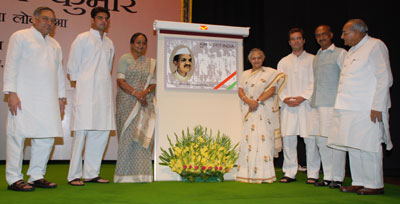 NEW DELHI, July 25: Lok Sabha Speaker Meira Kumar today released a stamp in the memory of late freedom fighter and former Deputy Mayor of Delhi Lala Ramcharan Agrawal.
NEW DELHI, July 25: Lok Sabha Speaker Meira Kumar today released a stamp in the memory of late freedom fighter and former Deputy Mayor of Delhi Lala Ramcharan Agrawal.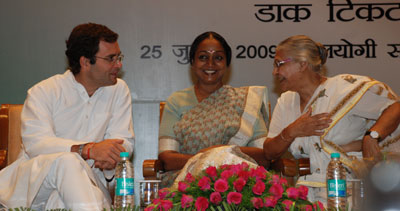 She added that the late Congress leader should serve as an example for youths and recalled that Agrawal was made the treasurer of Delhi Pradesh Congress Committee when he was just 19 years old.
She added that the late Congress leader should serve as an example for youths and recalled that Agrawal was made the treasurer of Delhi Pradesh Congress Committee when he was just 19 years old.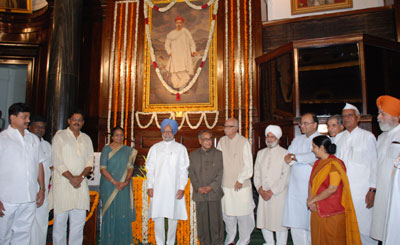 NEW DELHI, July 23: Prime Minister Manmohan Singh; Lok Sabha Speaker Meira Kumar; Union Ministers and Leaders of Opposition in Parliament led the nation in paying floral tributes at the portrait of Lokamanya Bal Gangadhar Tilak in the Central Hall of Parliament House on his birth anniversary today.
NEW DELHI, July 23: Prime Minister Manmohan Singh; Lok Sabha Speaker Meira Kumar; Union Ministers and Leaders of Opposition in Parliament led the nation in paying floral tributes at the portrait of Lokamanya Bal Gangadhar Tilak in the Central Hall of Parliament House on his birth anniversary today.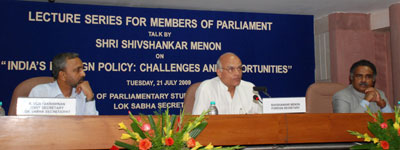 NEW DELHI, July 21: In a tacit admission that the controversial Indo-Pak joint statement could be a case of "bad drafting", foreign secretary Shiv Shankar Menon on Tuesday Tuesday today said its meaning was clear and that India will not budge on the issue of terrorism.
NEW DELHI, July 21: In a tacit admission that the controversial Indo-Pak joint statement could be a case of "bad drafting", foreign secretary Shiv Shankar Menon on Tuesday Tuesday today said its meaning was clear and that India will not budge on the issue of terrorism. 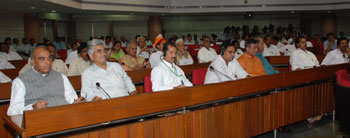 "Our intent is clear. We are not going to budge (on the issue of terrorism)," he added and referred to the Prime Minister's statement in Parliament on the document.
"Our intent is clear. We are not going to budge (on the issue of terrorism)," he added and referred to the Prime Minister's statement in Parliament on the document. 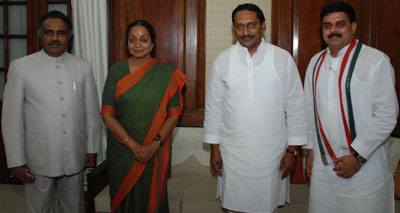
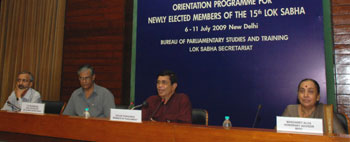 NEW DELHI, July 10: Former Union Minister and senior Congress leader, Oscar Fernandes, M.P., addressed the new Members of Parliament on “Member of Parliament Local Area Development Scheme (MPLADS)” in Parliament House Annexe here on Friday.
NEW DELHI, July 10: Former Union Minister and senior Congress leader, Oscar Fernandes, M.P., addressed the new Members of Parliament on “Member of Parliament Local Area Development Scheme (MPLADS)” in Parliament House Annexe here on Friday.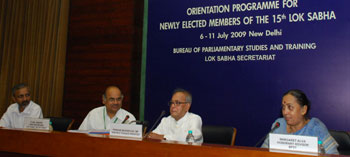 NEW DELHI, July 9: Union Minister of Finance Pranab Mukherjee addressed the new MPs on “The Budgetary Process” in Parliament House Annexe here today as part of the Orientation Programme for the newly-elected members of 15th Lok Sabha.
NEW DELHI, July 9: Union Minister of Finance Pranab Mukherjee addressed the new MPs on “The Budgetary Process” in Parliament House Annexe here today as part of the Orientation Programme for the newly-elected members of 15th Lok Sabha.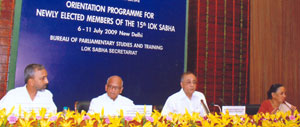 On Wednesday Mr Kishore Chandra S. Deo, M.P., addressed the new MPs on “Parliamentary Privileges” in Parliament House Annexe here as part of the Orientation Programme for the newly-elected members of 15th Lok Sabha.
On Wednesday Mr Kishore Chandra S. Deo, M.P., addressed the new MPs on “Parliamentary Privileges” in Parliament House Annexe here as part of the Orientation Programme for the newly-elected members of 15th Lok Sabha. NEW DELHI, July 9: The Lok Sabha on Thursday passed the Railway Budget for the year 2009-10 with a post-dividend cash surplus of Rs 8,361 crore by a voice vote. Replying to the marathon debate on the Budget in which around 131 members participated, railway minister Mamata Banerjee promised the House that the proposed projects would be completed during the current financial year.
NEW DELHI, July 9: The Lok Sabha on Thursday passed the Railway Budget for the year 2009-10 with a post-dividend cash surplus of Rs 8,361 crore by a voice vote. Replying to the marathon debate on the Budget in which around 131 members participated, railway minister Mamata Banerjee promised the House that the proposed projects would be completed during the current financial year.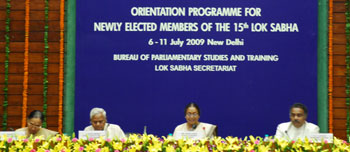 NEW DELHI, July 7: Lok Sabha Speaker Meira Kumar asked MPs to keep an open mind while discharging parliamentary duties inside and outside the House.
NEW DELHI, July 7: Lok Sabha Speaker Meira Kumar asked MPs to keep an open mind while discharging parliamentary duties inside and outside the House.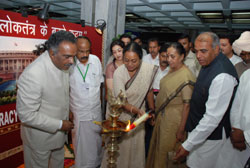 While discharging parliamentary duties inside and outside the House, each member must keep an open mind looking at the issues from a wider perspective of the development of the country, she said.
While discharging parliamentary duties inside and outside the House, each member must keep an open mind looking at the issues from a wider perspective of the development of the country, she said.  NEW DELHI, July 6: The government has announced a slew of tax sops, including an additional Rs 10,000 personal income tax exemption and scrapping of 10 per cent surcharge, while announcing cheaper loans to farmers and incentives for export and infrastructure to attain nine per cent growth.
NEW DELHI, July 6: The government has announced a slew of tax sops, including an additional Rs 10,000 personal income tax exemption and scrapping of 10 per cent surcharge, while announcing cheaper loans to farmers and incentives for export and infrastructure to attain nine per cent growth. SASARAM (Bihar), June 15: Lok Sabha Speaker Meira Kumar has ruled out her resignation from Congress as suggested by her predecessor Somnath Chatterjee.
SASARAM (Bihar), June 15: Lok Sabha Speaker Meira Kumar has ruled out her resignation from Congress as suggested by her predecessor Somnath Chatterjee. NEW DELHI, June 15: Former Speaker Somnath Chatterjee on Monday said that he has not given any advice to Meira Kumar to resign from Congress but had only spoken of the need for convention for the incumbent to quit to avoid any "unhappy experience."
NEW DELHI, June 15: Former Speaker Somnath Chatterjee on Monday said that he has not given any advice to Meira Kumar to resign from Congress but had only spoken of the need for convention for the incumbent to quit to avoid any "unhappy experience." 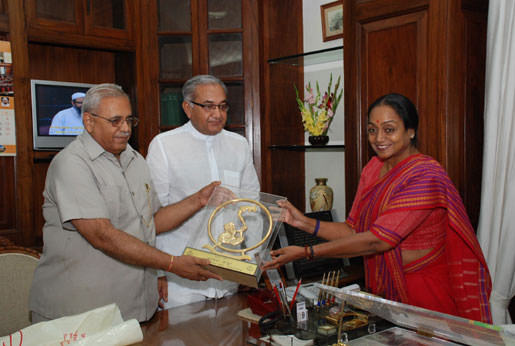
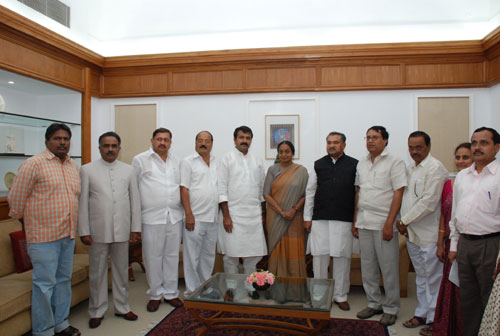 NEW DELHI, June 8: Welcoming a 9-member delegation from the Library Committee of Karnataka Legislature at the Parliament House here, the Lok Sabha Speaker, Mrs Meira Kumar, said that libraries are repositories of knowledge and information and that the representatives of the people should take advantage of such knowledge.
NEW DELHI, June 8: Welcoming a 9-member delegation from the Library Committee of Karnataka Legislature at the Parliament House here, the Lok Sabha Speaker, Mrs Meira Kumar, said that libraries are repositories of knowledge and information and that the representatives of the people should take advantage of such knowledge. 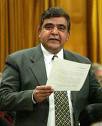 TORONTO, June 6: The election of Meira Kumar as India's first woman and Dalit speaker figured in the Canadian parliament on Friday, with Indian-origin MP Deepak Obhrai describing it as a 'miracle' of Indian democracy.
TORONTO, June 6: The election of Meira Kumar as India's first woman and Dalit speaker figured in the Canadian parliament on Friday, with Indian-origin MP Deepak Obhrai describing it as a 'miracle' of Indian democracy. NEW DELHI, June 3: Two years after India created history by electing a woman as its President, another Constitutional post which had so far remained the preserve of men made its way to a woman, that too hailing from the Dalit community. Meira Kumar, daughter of the late Babu Jagjivan Ram, was on Wednesday unanimously elected as Lok Sabha Speaker.
NEW DELHI, June 3: Two years after India created history by electing a woman as its President, another Constitutional post which had so far remained the preserve of men made its way to a woman, that too hailing from the Dalit community. Meira Kumar, daughter of the late Babu Jagjivan Ram, was on Wednesday unanimously elected as Lok Sabha Speaker. 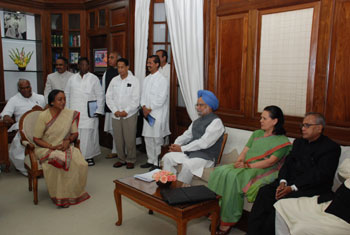 Soon after her formal election, in keeping with the spirit of the occasion, the prime minister, Leader of the House Pranab Mukherjee and Leader of the Opposition L K Advani escorted her to the Speaker’s chair.
Soon after her formal election, in keeping with the spirit of the occasion, the prime minister, Leader of the House Pranab Mukherjee and Leader of the Opposition L K Advani escorted her to the Speaker’s chair. 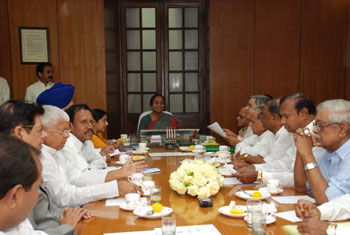 Observing that she was aware of successful tenures of her predecessors from Ganesh Vasudev Mavlankar to Somnath Chatterjee, the Speaker said they had worked to promote the dignity of the post and that she would continue the search for better methods. "I assure the House that I will pay full attention to all sections of the House. I also assure you that neither I will be biased against the Opposition nor I will give any opportunity to the treasury benches to complain," she said.
Observing that she was aware of successful tenures of her predecessors from Ganesh Vasudev Mavlankar to Somnath Chatterjee, the Speaker said they had worked to promote the dignity of the post and that she would continue the search for better methods. "I assure the House that I will pay full attention to all sections of the House. I also assure you that neither I will be biased against the Opposition nor I will give any opportunity to the treasury benches to complain," she said. 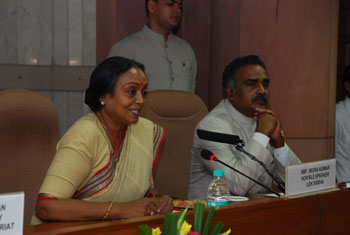 NEW DELHI, June 3: Lok Sabha Speaker Meira Kumar on Wednesday promised to be “entirely impartial” and give opportunities to every Member of Parliament to have his or her say. She asked political parties to rise above partisan considerations when decisions need to be taken on important national issues.
NEW DELHI, June 3: Lok Sabha Speaker Meira Kumar on Wednesday promised to be “entirely impartial” and give opportunities to every Member of Parliament to have his or her say. She asked political parties to rise above partisan considerations when decisions need to be taken on important national issues. NEW DELHI, June 4: The Government on Thursday declared that it will pursue a policy of "zero-tolerance" towards terrorism from whatever source it originates and seek to reshape relationship with Pakistan which should confront terror groups inimical to India.
NEW DELHI, June 4: The Government on Thursday declared that it will pursue a policy of "zero-tolerance" towards terrorism from whatever source it originates and seek to reshape relationship with Pakistan which should confront terror groups inimical to India.  NEW DELHI, June 4: Expecting the economy to slow down in the current fiscal amid global recession, President Pratibha Patil said that the new govt will focus on adversely-affected sectors like infrastructure, exports, SMEs, and housing to restore the growth momentum.
NEW DELHI, June 4: Expecting the economy to slow down in the current fiscal amid global recession, President Pratibha Patil said that the new govt will focus on adversely-affected sectors like infrastructure, exports, SMEs, and housing to restore the growth momentum. 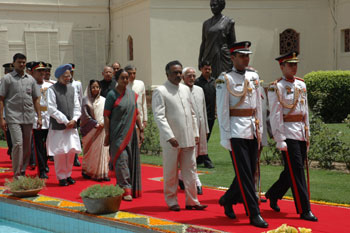 NEW DELHI: President Pratibha Patil on Thursday told that the UPA Government will vigorously pursue steps against illegal money of Indians in secret bank accounts abroad.
NEW DELHI: President Pratibha Patil on Thursday told that the UPA Government will vigorously pursue steps against illegal money of Indians in secret bank accounts abroad. 